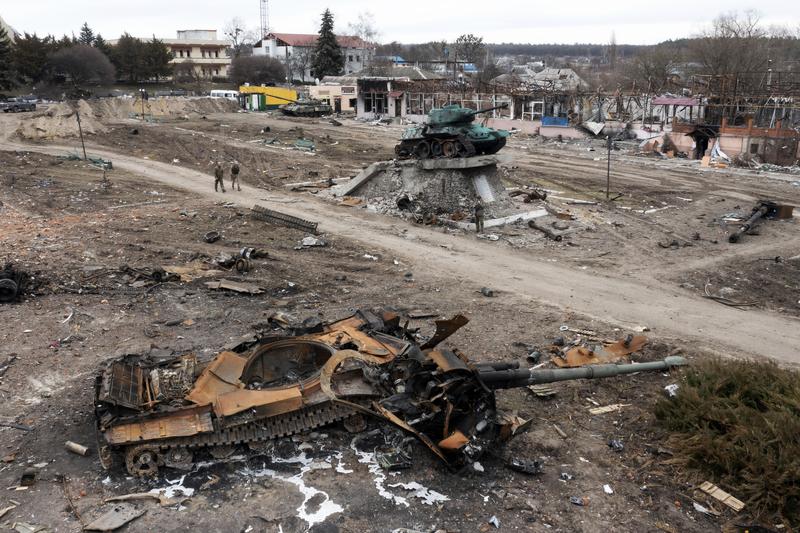 A soldier stands on a bridge destroyed by the Ukrainian army to prevent the passage of Russian tanks near Brovary, in the outskirts of Kyiv, Ukraine, March 28, 2022. (RODRIGO ABD / AP)
A soldier stands on a bridge destroyed by the Ukrainian army to prevent the passage of Russian tanks near Brovary, in the outskirts of Kyiv, Ukraine, March 28, 2022. (RODRIGO ABD / AP)
Long before the outbreak of the lingering Ukraine crisis, Beijing had been criticizing NATO’s consecutive expansion, reminding the world that the United States-led military bloc is accountable for initiating and fueling the tragedy by providing weaponry.
NATO’s presence should have ended at the end of the Cold War, it has a record of creating warfare, and its expanding reach is also threatening the hard-won peace in Asia, officials and scholars said.
“Beijing’s negativity on NATO’s legitimacy and its frequent expansion is not something recent but a long-standing and consistent position in recent decades,” said Yuan Zheng, deputy director of the Institute of American Studies of the Chinese Academy of Social Sciences.
Instead of being buried alongside its traditional rival, the Warsaw Treaty Organization, “NATO has developed into an encompassing grouping to better serve US hegemony and boost defense interdependence among its members, countering the world’s pursuit for peace”, Yuan said.
NATO convened a summit on Ukraine on March 24. That day was also the 23rd anniversary of NATO launching 78 days of airstrikes against the Federal Republic of Yugoslavia in 1999, targeting everything from medical facilities to schools, killing thousands of people and leaving nearly 1 million people displaced.
“We will not kneel and we will not beg, we want to keep the memory of the victims, and we will never forget what you did to this country and people,” Serbian President Aleksandar Vucic said at a memorial event on March 24.
Chinese Foreign Ministry spokesman Wang Wenbin mentioned on March 25 a missile attack in 1999 by NATO forces on the Chinese embassy in Belgrade that killed three Chinese journalists, as well as NATO’s use of depleted uranium bombs — prohibited by international conventions — during the airstrikes.
The US-led NATO is accountable for opening the Pandora’s box of the Ukraine crisis, and “Washington, with a huge obsession regarding its hegemony, started meddling in the Ukraine situation back in the 1990s”, said Diao Daming, an associate professor of US studies at Renmin University of China in Beijing.
“NATO has kept expanding eastward by adding new members in Europe five times, and US-led Western countries decided to define Ukraine as a geopolitical tool for containing and cornering Russia, leading to the Crimea crisis in 2014 and what is happening right now,” Diao said.
Over the past months, NATO members “have stepped up military support, providing anti-tank and air defense systems, drones, fuel and ammunition” to Ukraine, Jens Stoltenberg, NATO’s secretary-general, told reporters on March 23.
The bloc had been playing the role of initiator by providing weaponry before and during the Ukraine crisis, and this role was mirrored and enhanced by US President Joe Biden’s recent push to boost NATO deployment in Eastern Europe, said Wang Fan, vice-president of China Foreign Affairs University.
Vice-Foreign Minister Le Yucheng has openly questioned the legitimacy of NATO, calling it “a Cold War vestige” that “should have been consigned to history alongside the Warsaw Treaty Organization” with the disintegration of the then Soviet Union.
“In recent years, it even went so far as to flex its muscles in the Asia-Pacific. One could well anticipate the consequences of going down this path. The crisis in Ukraine is a stern warning,” Le said at a forum on March 19.
The ongoing Ukraine crisis has also triggered increasing concerns in countries and think tanks in the Asia-Pacific region over NATO’s role in the area, as well as the US boosting military alliances with countries in the region in order to counter China.
On Feb 11, the Biden administration unveiled a new version of its Indo-Pacific Strategy, saying that “competition with China” was one of the “urgent challenges” and calling for greater alignment and military buildup with its allies in the region.
“Such an ‘Indo-Pacific Strategy’ is as dangerous as the NATO strategy of eastward expansion in Europe. If allowed to continue unchecked, it would bring unimaginable consequences, and ultimately push the Asia-Pacific over the edge of an abyss,” said Le, the vice-foreign minister.
This strategy seeks to build an “Asia-Pacific version of NATO” and safeguard the system of hegemony led by the US. China is ready to work with various parties to boycott the “Indo-Pacific” clique that works for confrontation, said Deng Xijun, China’s ambassador to ASEAN, the Association of Southeast Asian Nations, at a virtual news conference on March 21.
Yang Baoyun, a professor of ASEAN studies at Thammasat University in Bangkok, Thailand, said the US strategy “aims to use alignment to create new divisions and rifts among countries in the region, force them to take sides, sabotage existing regional security architecture, and serve US self-interests”.
“It is inevitable that the Ukraine crisis will have a spillover effect on Asia,” Yang warned.
Several NATO members such as the US and the United Kingdom have sent warships and warplanes to the South China Sea in recent years, prompting strong protests from Beijing.
“Washington is still trying to incite countries involved in the South China Sea issue such as Vietnam and the Philippines to counter China,” said Chen Xiangmiao, associate research fellow of the National Institute for South China Sea Studies.
However, it is unlikely that the US will break the strong ties built between China and ASEAN countries, Chen said.


